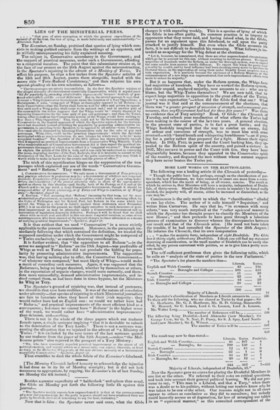[The Morning Chronicle lacked honesty to acknowledge the injustice it
had done us in its lie of Monday sennight ; but it did not lack meanness to appropriate, by copying, the Examiner's lie of last Sundey, en Monday the 4th instant.]
Besides a greater superfluity of " balderdash" and spleen than usual,
the Globe on Monday put forth the following little fib against this journal " The Specteter weekly repeats how unprecedented it is that at the commencement or a new uund popular reien. 8ce. the party its power S110111,1 not have reinforced their majority by hundreds, instead of remaining, to say the best. statiodary."
Now that is false: the Spectator never said once, what the Globe charges it with repeating weekly. This is a species of lying of which the Globe is too often guilty. Its common practice is to impute to opponents what they never said, and having raised what, in the Globe passes for an argument upon this falsehood, to call upon the pars; attacked to justify himself. But even when the Globe assumes its facts, it is not difficult to demolish his reasoning. What follows is in.
tended as an apology for the Whig defeat at the elections. .
" Let it, however, be remembered, that there are other unprecedented circumstances which go far to account for this one, without resorting to invidious glosses. To expect majorities of hundreds under the Reform, as under the Borough system, was to expect the same results from sources totally different. To expect this when the party most p)werful by wealth and by local influence haul been straining every nerve to increase its electoral forces, in the expectation of using them under friendly Court auspices, was a vain expectation. It is precisely because the existence of a Reform Ministry at the commencement of a new reign was unprecedented, that such unprecedented effiurts were made to reduce its majority."
But it so happens that, under the Reform system, the Whigs have had majorities of hundreds. They have so worked the Reform system, that their unpaid, unplaeed majority, now amounts to six : who are to S t blame, but the Whig-Tories themselves? We are now told, that to expect large majorities in opposition to the great efforts of the Tories, was "a vain expectation "-when did the Globe find that out? h Was there journal was it that said at the commencement of the elections, that there was "a greater prospect of accession of strength, and consequent permanence, than any Government had had for these five years?" IV no evidence then of Tory activity? Read, 0 Globe ! the Chronicle of Tuesday, and refresh your recollection of what efforts the Tories had been making in the course of the last two years. A general election, in the present state of parties, is in fact a great battle; and the Whigs foolishly imagined that the way to combat an enemy, full of ardour and conscious of strength, was to meet him with arms reversed-with "bated breath and whispering humbleness "-as if pray. ing for a parley rather than prepared for a fight. Hence their signal defeat. In 1835, PEEL in power and the Court backing him, they appealed to the Reform spirit of the country, and gained a victory : in 1837, MELBOURNE in power and the Court with him, they have been disgracefully beaten, because they appealed to the Conservative spirit of the country, and disgusted the men without whose earnest support they have never beaten the Tories yet.


























 Previous page
Previous page